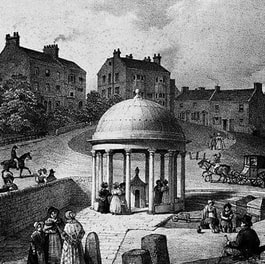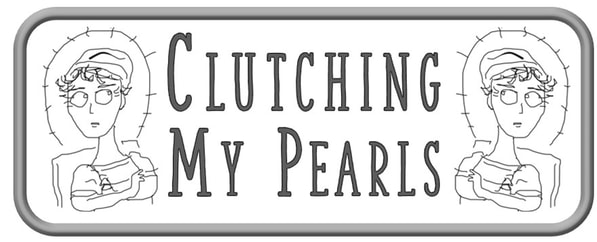| This blog explores social attitudes in Jane Austen's time, discusses her novels, reviews forgotten 18th century novels, and throws some occasional shade at the modern academy. The introductory post is here. My "six simple questions for academics" post is here. |
 Harrogate spa well, Wikicommons, detail
Harrogate spa well, Wikicommons, detail Modern Manners, an 1817 novel by an anonymous authoress, starts with the marriages of the parents of our main characters. Amelia has the good luck to captivate Henry Fitzgerald, a “gentleman from the Indies” (aka a man with a colonial fortune) who all the “Mamma’s” of the neighbourhood are angling after. Amelia’s match means she goes off to live in London and mingle with the ton. Her sister Matilda marries Mr. Oswald, a respectable vicar with a small independent fortune. Matilda “sighed at the idea of… her sister [Amelia] being lost in the fashionable vortex of dissipation and vanity."
The years pass, the countrified Oswalds have a daughter and the city-dwelling Fitzgeralds have two sons and a daughter. Mr. Fitzgerald becomes an MP and then is elevated to the peerage; now, instead of being the wife of a nouveaux riche Indian nabob, Amelia is Lady Fitzgerald. An easy-going woman of no strong opinions, Amelia is more engaged with her morning visits and playing cards than paying attention to the education and moral upbringing of her daughter Julia.
The Fitzgeralds come to visit the Oswalds and their lovely, sensible, daughter Emma. Julia Fitzgerald is a social butterfly and an enthusiast for Rousseau, rugged scenery, and defying whatever it is her parents want her to do. We learn that the oldest son, Frederic, is not very attentive to his fiancée. She is Elvina Dorrington, an Indian heiress. Emma Oswald, our main heroine, is intelligent, principled, and sincerely devout, and the author struggles to make her as interesting as Elvina and Julia...
When the Fitzgeralds move on from the Oswald’s quiet parsonage for a visit to Harrowgate (a spa town in North Yorkshire), they take Emma with them to give her a taste of high society and a chance to meet some eligible men. Many more characters join the tale. This novel is set amongst the privileged and titled, although it’s quite likely the anonymous author never met a lord in her life. Other surnames in the novel include: Montreville, Wimbledon, Seymour, Nevison, Beaumont, Percival, Farquarson, and Mansfield.
Elvina the heiress is frequently described as “indolent,” and “languid,” which was typical for descriptions of people from the East or West Indies. If we had actually met Miss Lambe, “chilly and tender” in Jane Austen’s unfinished Sanditon, she might have been indolent and languid, too. Elvina's languid beauty temporarily attracts the intelligent and gallant Captain Nevison, until he realizes she’s engaged to Frederic Fitzgerald, then he hastily backs off.
Meanwhile, Julia has fun flirting with the outgoing Captain Farquarson and she ignores another suitor, Lord Mansfield. By the way, this is not THE Lord Mansfield, if you know who Lord Mansfield is. This Lord Mansfield is just an eligible but rather quiet and strait-laced young lord in want of a wife. Mansfield is dazzled by Julia's “beauty and commanding powers.” Yet, some of her beliefs and actions distress him. "Lord Mansfield had a dislike to any thing like private theatricals,” so he is more than merely jealous when Julia acts in dialogues with the flashy Farquarson as part of an evening’s entertainment. Farquarson moves in hard on Julia: he “was almost a constant inmate of the house, and if he sometimes took an opposite view of the subject to Julia, in the end, he always professed himself convinced by her arguments… the more delicate admiration of Lord Mansfield, compared with his, was insipid.”

Then the young people all go boating on the lake, and Elvina accidentally falls in. Her fiancé can’t be bothered to rescue her, but Captain Nevison promptly dives in and fishes her out, so of course she falls madly in love with him, just as he is realizing he is in love with Emma.
More complications: Emma has another suitor, a titled Lord no less, Lord Wimbledon. His fashionable friends laugh at him for mooning over a “country parson’s daughter,” but he realizes that she is a superior young woman and the way she conducts her life makes him feel ashamed of how he has trifled away his.
He proposes, Emma politely turns him down, a refusal which causes consternation and surprise with her fashionable Fitzgerald cousins. Turn down a Lord? She can’t help it, she loves the intelligent and principled Captain Nevison, and although he’s got to go join Wellington in the Peninsula to fight Napoleon, she agrees to an engagement.
 The same plot point occurs in Jane Porter's Thaddeus of Warsaw
The same plot point occurs in Jane Porter's Thaddeus of Warsaw Since there are no impediments of class or wealth to create difficulties for our hero and heroine, we must turn to misunderstanding to keep them apart: Elvina Dorrington can’t keep her lust for Nevison under control. She goes to the inn where he’s staying and literally throws herself at him: “'Tis you have made me abhor the rest of mankind, and I loathe their very sight; and yet—and yet—you can seek another!'… she threw herself before him, and embracing his knees, exclaimed, ‘Oh, save me! Save me!' Her bonnet fell, her beautiful hair with the motion escaped, and her tresses floated in wild disorder. ‘Would,’ cried he, with a look of agony, ‘that I could save you from yourself—from the torment of your own reproaches!’"
(This is similar to a scene in Jane Porter’s wildly popular novel, Thaddeus of Warsaw, down to the discarded bonnet, the loosened hair and hero's reference to the fates of fallen woman to make the girl come to her senses.)
Unfortunately, the false rumor comes back to the Oswalds that Nevison and Elvina have eloped together, and Emma sorrowfully renounces him:
“I still love….[but] never will I unite my fate with a libertine, a destroyer of the honour and peace of one of my own sex. It is true I feel, tenderly feel; for had I not reposed my trust, and placed my confidence in his virtue and truth?”
Nevison, in far-off Portugal, is unable to clear up the mystery for the time being, and the Emma/Nevison plot recedes to the background.
 Turkish delights at the Masquerade
Turkish delights at the Masquerade The Julia/Farquarson/Mansfield love triangle takes center stage. As you'll recall, Lord Mansfield loves the imprudent Julia, “even against his better reason” while Julia is infatuated with Captain Farquarson, unaware that he’s a slimy fortune hunter. (He’s Irish, so what can you expect).
Madcap Julia elopes with Captain Farquarson from a masquerade ball (never go to a masquerade ball, girls, you are just asking for trouble). Retrieved in the nick of time by her father, the family tries to hush the whole thing up, but Farquarson blackmails Julia for breach of promise money. By an amazing coincidence, Julia meets his impoverished sister, who tells her that she has to find a job because her brother does nothing to help her, or their widowed mother. Julia also learns that he already has a wife!
And I’m going to mention another subplot which gives the main heroine something to do while she’s nursing her broken heart back at the parsonage. Emma’s friend Harriet Merton comes to visit and meets Mr. Oswald’s new curate, fresh out of university. Mr. Roberts doesn’t know much about women and he ignores Emma while he sits and discusses Greek and the classics with Mr. Oswald. But when he hears Emma discourse on appropriate topics such as moral philosophy, his "curiosity was awakened. He had a vague notion, that the knowledge of women was very circumscribed, that their conversation must be on the topics of the day, dress, or at best on the occupations of domestic life. It is true, his information was merely derived from periodical papers, which lashed the follies of the times, represented the beautiful simpletons, or a disgusting picture of pedantry and affected learning. A new class of beings seemed to rise before him as he beheld Emma Oswald and her friends.”
Harriet figures that the curate is falling for Emma, but “Emma drew more just conclusions. She saw him surprised and amused with the power of Harriet, and she saw likewise that he was gratified by her never-failing appeal to him on any subject on which she was uninformed.” Yes, Emma is right—the young minister is falling for Harriet.
 Actually, that's Thaddeus of Warsaw again, but you get the idea
Actually, that's Thaddeus of Warsaw again, but you get the idea Back in London, Julia agrees to meet the blackmailing Farquarson secretly in her back garden at night. (Again, ladies, just—don’t do this). She intends to confront him with the fact that he’s already married, so he can stop badgering her for money. Like a proper villain, Farquarson announces he plans to abduct her and compromise her. He sneers, “are you not completely in my power?” Luckily, Lord Mansfield, knowing that Farquarson has been hanging around, has also been watching Julia’s house. He springs in to rescue her.
Julia is safe, but the shock of the confrontation makes her fall ill with a severe fever, as one does, or at least as one does in novels of the long 18th century. Her illness is serious and prolonged and Emma comes to nurse her because Lady Fitzgerald just isn’t up to it.
Julia sinks into depression as she reflects with great remorse on her past conduct. She concludes that a good and principled man like Lord Mansfield shouldn't want to have anything to do with her. She sends him away: “'It is all futile.—Shall I be so base as to take advantage of a passion which, when its brilliancy passes off, will see me in a different light, because possessed of opposite opinions to yourself?—No, it can never be.'
“In vain Lord Mansfield pleaded his devotion, his affection; in vain he declared them unalterable…”
Meanwhile, over in Portugal, Julia’s brother Edward runs into Captain Nevison, and also into his brother's ex-fiancée Elvina, who has disguised herself as a young cadet in order to get close to Nevison. The misunderstanding is sorted out. Elvina repents her wild conduct and takes ship for England. Coincidentally, Emma and her father witness the shipwreck which brings Elvina, half-dead, to the shores of England and Emma nurses her. Mr. Oswald helps her prepare to meet her maker before she dies.
To be continued...
| I'm listening to Lucy Worsley's biography of Agatha Christie and learned that Harrogate was the spa town she retreated to when she famously disappeared for 11 days in 1926 during a time of personal crisis. |

 RSS Feed
RSS Feed